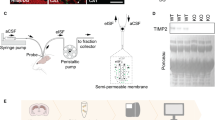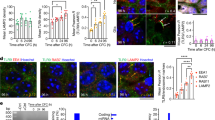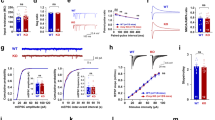Abstract
Cognitive deficits are among the most devastating changes associated with the aging process. Age-related decrement in performance on learning tasks1,2 is correlated with substantial changes in neuronal signal processing in the hippocampus3,4,5. Here we show that elevated expression of small-conductance Ca2+-activated K+ channels (SK channels) of the SK3 type in hippocampi of aged mice contributes to reduced long-term potentiation (LTP) and impaired trace fear conditioning, a hippocampus-dependent learning task6,7.
This is a preview of subscription content, access via your institution
Access options
Subscribe to this journal
Receive 12 print issues and online access
$209.00 per year
only $17.42 per issue
Buy this article
- Purchase on Springer Link
- Instant access to full article PDF
Prices may be subject to local taxes which are calculated during checkout


Similar content being viewed by others
References
Houston, F.P., Stevenson, G.D., McNaughton, B.L. & Barnes, C.A. Learn. Mem. 6, 111–119 (1999).
Barnes, C.A., Nadel, L. & Honig, W.K. Can. J. Psychol. 34, 29–39 (1980).
Landfield, P.W., McGaugh, J.L. & Lynch, G. Brain Res. 150, 85–101 (1978).
Landfield, P.W. & Pitler, T.A. Science 226, 1089–1092 (1984).
Wu, W.W., Oh, M.M. & Disterhoft, J.F. Ageing Res. Rev. 1, 181–207 (2002).
McEchron, M.D., Bouwmeester, H., Tseng, W., Weiss, C. & Disterhoft, J.F. Hippocampus 8, 638–646 (1998).
Wallenstein, G.V., Eichenbaum, H. & Hasselmo, M.E. Trends Neurosci. 21, 317–323 (1998).
Storm, J.F. Prog. Brain Res. 83, 161–187 (1990).
Sah, P. Trends Neurosci. 19, 150–154 (1996).
Pedarzani, P. et al. J. Biol. Chem. 276, 9762–9769 (2001).
Schumacher, M. & Adelman, J.P. Nature 417, 501–502 (2002).
Tacconi, S. et al. Neuroscience 102, 209–215 (2001).
Moore, C.I., Browning, M.D. & Rose, G.M. Hippocampus 3, 57–66 (1993).
Lanahan, A., Lyford, G., Stevenson, G.S., Worley, P.F. & Barnes, C.A. J. Neurosci. 17, 2876–2885 (1997).
Blank, T., Nijholt, I., Eckart, K. & Spiess, J. J. Neurosci. 22, 3788–3794 (2002).
Acknowledgements
This work was supported by the Max Planck Society. We thank Dr. John Disterhoft for fruitful discussions and his generous support in obtaining the animals for this study.
Author information
Authors and Affiliations
Corresponding author
Ethics declarations
Competing interests
The authors declare no competing financial interests.
Supplementary information
Rights and permissions
About this article
Cite this article
Blank, T., Nijholt, I., Kye, MJ. et al. Small-conductance, Ca2+-activated K+ channel SK3 generates age-related memory and LTP deficits. Nat Neurosci 6, 911–912 (2003). https://doi.org/10.1038/nn1101
Received:
Accepted:
Published:
Issue Date:
DOI: https://doi.org/10.1038/nn1101
This article is cited by
-
Age-related hearing loss pertaining to potassium ion channels in the cochlea and auditory pathway
Pflügers Archiv - European Journal of Physiology (2021)
-
Fusion transcripts in normal human cortex increase with age and show distinct genomic features for single cells and tissues
Scientific Reports (2020)
-
Melatonin Improves Memory Deficits in Rats with Cerebral Hypoperfusion, Possibly, Through Decreasing the Expression of Small-Conductance Ca2+-Activated K+ Channels
Neurochemical Research (2019)
-
SK3 Channel Overexpression in Mice Causes Hippocampal Shrinkage Associated with Cognitive Impairments
Molecular Neurobiology (2017)
-
Chronic Intermittent Ethanol Exposure Enhances the Excitability and Synaptic Plasticity of Lateral Orbitofrontal Cortex Neurons and Induces a Tolerance to the Acute Inhibitory Actions of Ethanol
Neuropsychopharmacology (2016)



